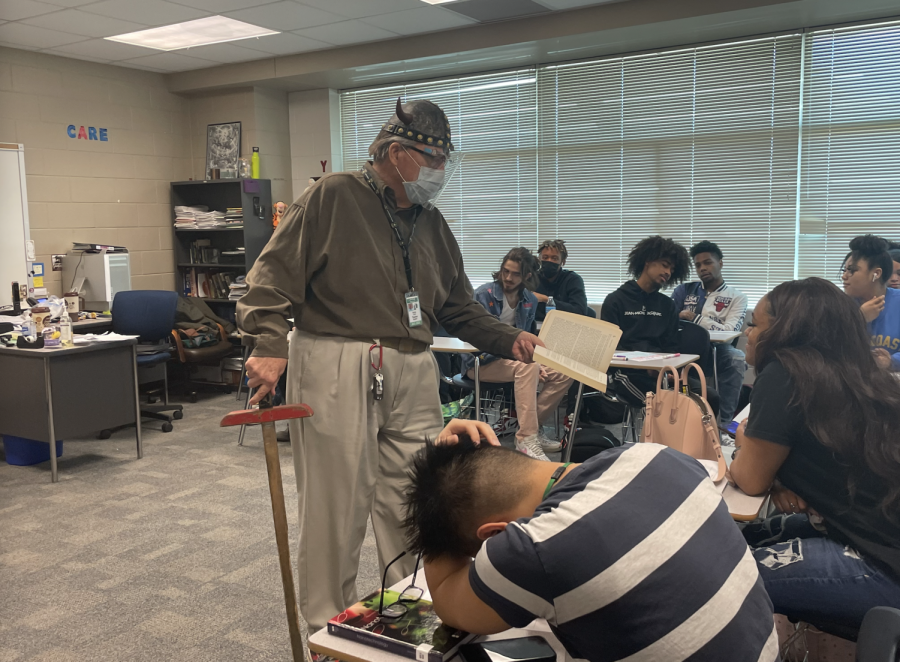It’s Okay to Not Be Okay!
English 4 and Creative Writing teacher, George Olsen, takes a different approach to teaching.
Toxic positivity: some would say it’s a confusing juxtaposition, others might say it’s a harsh truth in the work environment. The term, as defined b![]() y University of Washington Medicine, means ‘dismissing negative emotions and responding to distress with false reassurances’ and is a common but rarely talked about term for teachers. Oftentimes teachers have to act like what an adult is “supposed” to be: perfect, composed, and optimistic, when that’s really not the case. Although a positive mentor can be a positive thing for students, teachers might find themselves having to repress any inner emotions around their students.
y University of Washington Medicine, means ‘dismissing negative emotions and responding to distress with false reassurances’ and is a common but rarely talked about term for teachers. Oftentimes teachers have to act like what an adult is “supposed” to be: perfect, composed, and optimistic, when that’s really not the case. Although a positive mentor can be a positive thing for students, teachers might find themselves having to repress any inner emotions around their students.
Most teachers who have been in the education business for a while now have learned one trick to cope with stress and inner negativity while at school: fake it till you make it. Although this strategy is not always healthy, it has come in handy to teachers like coach and math teacher, Matthew Allen. Over the years Allen has perfected this display of positivity in a healthy way. For him, putting up a front is not so much a sham as it is a way for him to bring out his own positive energy.
“I fake it till I make it. I just go with it until I get into the rhythm and start feeling like I’m at my best. Like, you’re acting positive, you’re pushing, you’re going until it actually hits you that you are being positive and at your best,” said Allen.
Allen personally feels that administrators may sometimes get detached from their teachers as individuals, even if it’s not on purpose. They often start off as teachers themselves but as the years heighten their roles in the school, it’s easy to forget what the teacher life was like.
“I think sometimes people that are in charge of schools, whether it’s the principals or it’s the superintendent or the assistant superintendents, sometimes they get a little disconnected. They don’t remember what it was like being in the classroom and being weighed down with paperwork because they’ve not done it in a while and they feel kind of disconnected so if they ever get connected back in they might realize, ‘oh, we’re putting too much or asking too much of our teachers,’” Allen said.
Many teachers, like English 4 and Creative Writing teacher George Olsen, have worked in several academic environments but have found a way to have a healthy relationship with their students about mental health. Olsen has been teaching for over 30 years and seldom takes sick days, instead choosing to go through with his job, but after losing his wife he took a different approach to coping with his loss and avoiding toxic positivity that could prove to be harmful to not only him, but his students as well.
“While I tried to hide my wife, it was unbearable, because I was keeping it all inside internally. And that was not healthy. I came to the realization that I needed to share a portion of my experience with my students in order that I could be more honest, for my own health, and at the same time present it in a way that it would be of some kind of benefit to them because everyone’s going to experience death in their family and it might be the very next day it might be 20 years down the road,” said Olsen.
Olsen has learned that he can do so much more than just teach academic material to his students. Through his experiences, he can give his students life lessons that he feels will help them when they themselves are going through something. Despite the despair of losing his wife, Olsen believes his experience has changed him as a person and as a teacher.
“It’s part of understanding the pattern of life, the cycle of life and that nobody escapes and you’re not alone. So I think there was an important lesson and it taught me a great deal of empathy. Having been that far down you really start to see others in a different light because you become more compassionate, you become more aware, more sensitive, and I think it made me a better teacher,” said Olsen.
Personally, Olsen feels that the administration is incredibly supportive when it comes to teachers showing their more vulnerable sides to students. The principal, Ashley Alloway, has kept up the standards of, as a school, focusing on students’ best interests more than their grades or test scores, that Lake Ridge’s first principal, Shaun Scott, set so many years ago. Through her newsletter she has given a great deal of importance to student and faculties mental health and Olsen appreciates that, believing it is one of the core reasons there is more of a healthy portrayal of the reality of mental health for teachers at school than there is toxic positivity.
“It’s a little bit like the presentation they make in an airplane before they take off and the flight steward or stewardess will tell you that in the event of an emergency, the oxygen mask will drop down and if you have an infant on your lap, you use the oxygen mask first instead of giving it to immediately to the infant because if you don’t survive the baby won’t survive. So it’s really important, I think, following that same model, that if we’re not healthy we can’t deliver a healthy product. So again, it goes right back to the administration. If you have a great principal you have a great school. That’s what I believe,” Olsen said.
As COVID and the year continues, Allen and many other teachers have more stress than ever. Between staff and students absences, added with the shortage of substitutes, the administration as a whole is in work mode, with little space for anything else. AP World History teacher Rena Long understands the school’s plight and hopes their trial will pay off.
“I think people are trying, I think they just don’t really know what to do. Maybe stop relying on us to take up the slack for when there’s teachers out and nobody to cover classes. I think our administration is really trying, it’s just an impossible situation,” said Long.
Although many teachers and schools around the world struggle with toxic positivity in the education system, Lake Ridge seems to be more open about everyone’s feelings in general. The school has counselors that both students and teachers alike can go to whenever they need support, and even people that the counselors themselves go to. One person who specializes in helping people cope with their mental health at the school is student support counselor, Lori Cook. Cook believes Lake Ridge has done a good job at avoiding toxic positivity in a healthy way.
“I don’t think that it’s been said that you have to put up a positive front for the school, I think our teachers have been very up front with their students that this has been as much of a struggle year for them as it has been for the students. There’s never really been a ‘you have to put up a bright face for the students.’ Our administration is very open with them to say ‘it’s okay for you to be real and to be honest with the kids.’ So, I don’t think there is really a lot of toxic positivity in our school because our administration has been very real about that. Our administration is very, very understanding about that. They understand that we all have lives, that school is not our life,” Cook said.
COVID-19 has certainly been a part of the downfall of many people’s mental health since it first started spreading, but this year as more students come back from virtual learning and adjust to schooling with a virus going around, there is more stress than ever. The administration has made the best of the situation by showing students it’s okay to have problems and Cook believes that it has made the Lake Ridge community more understanding than ever.
“This year has been a struggle for all of us, no matter if you’re a teacher or a student, this has probably been the hardest year that all of us have had, including the administration, and so they feel it as well. Because of that I think they are very understanding knowing that all of us across the board are struggling. They realize you don’t have to put on a brave face, that it’s okay that you’re struggling. It shows our kids that you’re human and often gives our kids permission to not be okay,” Lori said.
Cook wants teachers to know that she and the administration are there for them, and assures them that they are not expected to be some sort of knowledge granting emotional support pillar, instead of real functioning people with legitimate problems who are sometimes in need of support themselves.
“They don’t have to put up a positive front, it’s okay for them to not be okay. That’s the biggest thing that everybody has to understand is that you don’t have to act a certain way,” Cook said. “However you’re feeling is okay. It’s okay to not be okay.”


